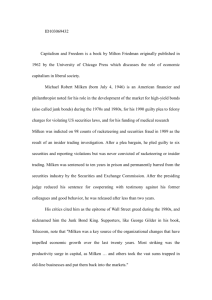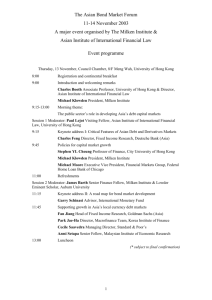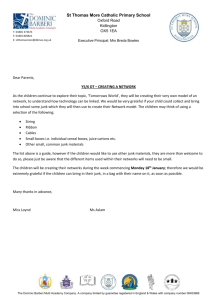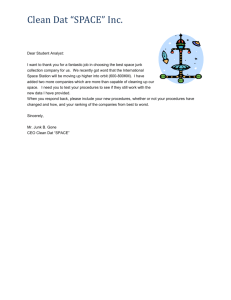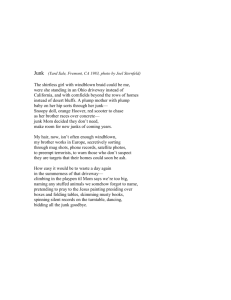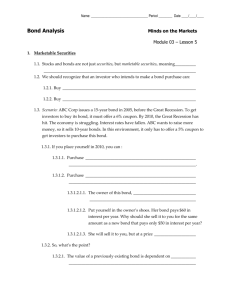High-yield Debt From Wikipedia, The Free Encyclopedia
advertisement
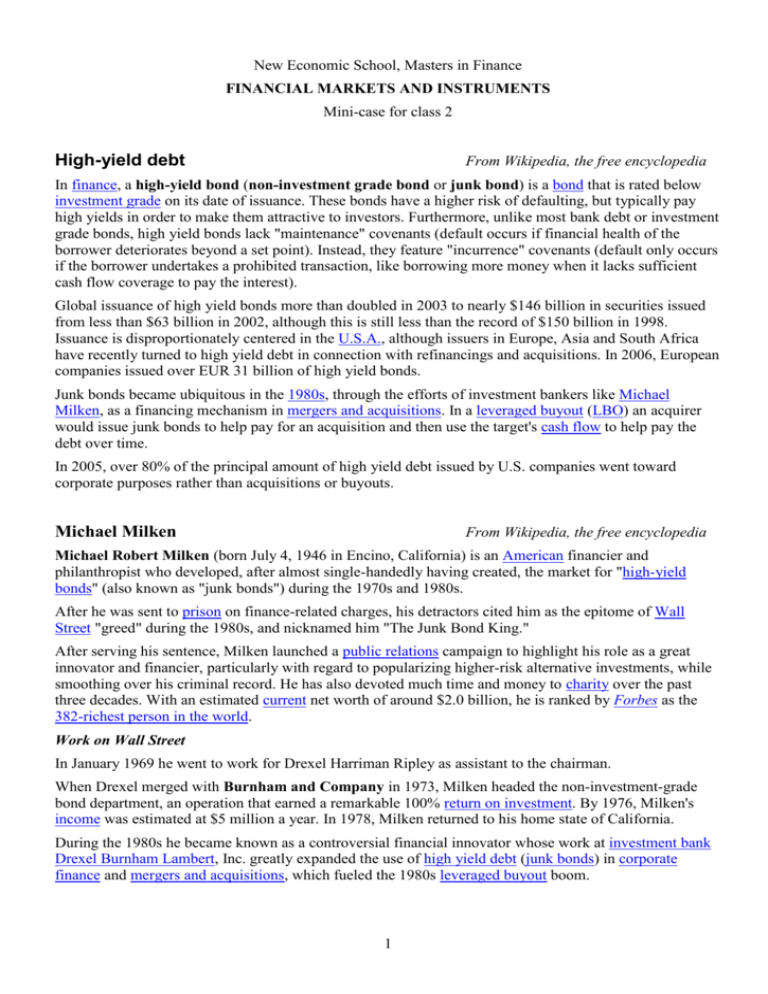
New Economic School, Masters in Finance FINANCIAL MARKETS AND INSTRUMENTS Mini-case for class 2 High-yield debt From Wikipedia, the free encyclopedia In finance, a high-yield bond (non-investment grade bond or junk bond) is a bond that is rated below investment grade on its date of issuance. These bonds have a higher risk of defaulting, but typically pay high yields in order to make them attractive to investors. Furthermore, unlike most bank debt or investment grade bonds, high yield bonds lack "maintenance" covenants (default occurs if financial health of the borrower deteriorates beyond a set point). Instead, they feature "incurrence" covenants (default only occurs if the borrower undertakes a prohibited transaction, like borrowing more money when it lacks sufficient cash flow coverage to pay the interest). Global issuance of high yield bonds more than doubled in 2003 to nearly $146 billion in securities issued from less than $63 billion in 2002, although this is still less than the record of $150 billion in 1998. Issuance is disproportionately centered in the U.S.A., although issuers in Europe, Asia and South Africa have recently turned to high yield debt in connection with refinancings and acquisitions. In 2006, European companies issued over EUR 31 billion of high yield bonds. Junk bonds became ubiquitous in the 1980s, through the efforts of investment bankers like Michael Milken, as a financing mechanism in mergers and acquisitions. In a leveraged buyout (LBO) an acquirer would issue junk bonds to help pay for an acquisition and then use the target's cash flow to help pay the debt over time. In 2005, over 80% of the principal amount of high yield debt issued by U.S. companies went toward corporate purposes rather than acquisitions or buyouts. Michael Milken From Wikipedia, the free encyclopedia Michael Robert Milken (born July 4, 1946 in Encino, California) is an American financier and philanthropist who developed, after almost single-handedly having created, the market for "high-yield bonds" (also known as "junk bonds") during the 1970s and 1980s. After he was sent to prison on finance-related charges, his detractors cited him as the epitome of Wall Street "greed" during the 1980s, and nicknamed him "The Junk Bond King." After serving his sentence, Milken launched a public relations campaign to highlight his role as a great innovator and financier, particularly with regard to popularizing higher-risk alternative investments, while smoothing over his criminal record. He has also devoted much time and money to charity over the past three decades. With an estimated current net worth of around $2.0 billion, he is ranked by Forbes as the 382-richest person in the world. Work on Wall Street In January 1969 he went to work for Drexel Harriman Ripley as assistant to the chairman. When Drexel merged with Burnham and Company in 1973, Milken headed the non-investment-grade bond department, an operation that earned a remarkable 100% return on investment. By 1976, Milken's income was estimated at $5 million a year. In 1978, Milken returned to his home state of California. During the 1980s he became known as a controversial financial innovator whose work at investment bank Drexel Burnham Lambert, Inc. greatly expanded the use of high yield debt (junk bonds) in corporate finance and mergers and acquisitions, which fueled the 1980s leveraged buyout boom. 1 Through his business acumen, the network of contacts and clients, and the trust he had earned from "buy side" investors (buyers of primary market debt issues) as well as Milken's issuance of the highly confident letter, he had the ability to raise tremendous amounts of money. He was a big contributor to the success of Drexel, that largely due to Milken went from $1.2 million in fees to over $4 billion in 1986, making it the most profitable firm on Wall Street at the time. In June 1989, Milken resigned from Drexel to form his own company, International Capital Access Group. This new venture was supposed to help workers and companies in building businesses. While he is best known for his successful financing through high yield bonds, he also employed equitybased securities, hybrids and scores of other financial instruments in more than a dozen asset classes to help clients grow. While having an illustrious and productive career, his rivals, which combined had minute marketshares, often alleged tactics he and his associates employed bordered on illicit behaviour. Amongst his detractors have been Martin Fridson formerly of Merrill Lynch and author Ben Stein. Milken's high-yield "pioneer" status has proved dubious as studies show "original issue" high-yield issues were common during and after the Great Depression. Others such as Stanford Phelps, an early co-associate and rival at Drexel, have also contested his credit as pioneering the modern high-yield market. Legal charges In 1989, Rudy Giuliani, future prominent Republican politician and Mayor of New York and then-United States Attorney for the Southern District of New York, charged him under the RICO act with 98 counts of racketeering and fraud, and he was indicted by a federal grand jury. After a plea bargain, Milken pled guilty to six lesser securities and reporting violations. He paid a total of $900 million in fines and settlements relating primarily to civil lawsuits. He was banned for life from the securities industry. Judge Kimba Wood, at Milken's sentencing, told him: You were willing to commit only crimes that were unlikely to be detected.... When a man of your power in the financial world... repeatedly conspires to violate, and violates, securities and tax business in order to achieve more power and wealth for himself... a significant prison term is required. Wood recommended a 10-year prison sentence, of which, in her opinion, Milken should have served at least 36 to 40 months. However, Milken served only about 22 months (from March 1991 until January 1993) before being released. Upon his release, he still had net worth of over $1 billion even after paying $600 million in fines and settlements. He is now worth around $2 billion and has long since entered other business ventures. In 1998, without admitting any guilt, he returned $47 million in fees to settle another SEC charge related to the order in 1991 barring him from securities industry. He allegedly breached the order when he advised MCI/News Corporation in a transaction in 1995, for which he received $27 million in advisory fees, and when he advised Revlon chairman Ronald Perelman on a Revlon/New World Communications deal in 1996, with $15 million in fees to Milken. In 1996, he received $50 million when Time Warner acquired Turner Broadcasting. The SEC did not bring up the last deal in the charge. Guilty pleas Milken planned or thought to engage in a series of unlawful security transactions. Charge involving tax fraud. The charge relates to Ivan Boesky’s false 13-d statement. Milken suggested that Ivan Boesky buy MCA stock to hide that Golden Nugget was selling and to assure him no loss in a sale to Drexel. Helped a client reduce his income tax liability by selling him two investments and then buying them back at a lower price. 2 Failed to disclose in written form an agreed-upon adjustment in transaction prices between Drexel and a client. Assessments of Milken's accomplishments Judgments of Milken's accomplishments - namely whether they were good for the U.S. economy or if they were ethical - tend to depend on the ideology of the observer and usually fall within two groups. Milken's supporters tend to be libertarian, including economist Milton Friedman. This group argues (as Friedman did in his 1971 article, Does Business Have Social Responsibility?), that no special moral obligations apply to businessmen and, since Milken's actions, by and large, were legal at the time, he did nothing wrong. Generally speaking, they argue: Junk bonds were a brilliant innovation and even today occupy a large part of most investment portfolios. A large market for junk bonds came into existence after savings and loan banks were deregulated. The government made Milken a scapegoat for the savings and loans scandal. Ambitious prosecutors such as Rudy Giuliani practically forced him to plead guilty, although some supporters continue to maintain Milken was completely innocent. On the other hand, individuals who believe businessmen should adhere to higher moral standards, such as financier Warren Buffett, condemn many of Milken's actions. While acknowledging the ingenuity of Milken's financial innovations, they also argue that: Junk bonds are a high-risk investment; any informed investor should only allocate a portion of a well-diversified portfolio to them. Milken artificially tampered with the economic laws of supply and demand. When the demand for junk bonds exceeded the supply, he created more "fallen angels" by promoting corporate raids that reduced the credit ratings of otherwise-sound companies into junk status. In manipulating the supply of bonds, he also artificially manipulated its value. When the artificially inflated junk bond market collapsed, this left policy holders (including employees of many companies who had replaced their pension systems with annuities purchased from the corrupted insurance companies) holding worthless paper. He compensated himself out of proportion to his work. The most controversial are "corporate raids" Milken fostered to allow smaller companies to acquire older and larger corporations. The critics are mixed as to the economic effect of such brash attacks on the establishment. The debate is ongoing. In May 2006, The Economist alluded to the disputed legacy of the financier. Within libertarian circles, Milken is often treated as a cause celebre, while detractors, such as James B. Stewart, claim that Milken became wealthy by destroying rather than building American businesses. The controversy is not lessened by the fact that some supporters of Milken, for example, Daniel R. Fischel, are or were employees or co-workers of Milken. The insider story - Michael Milken case National Review, May 28, 1990 by Margaret Laws I never thought he'd make it. I thought he didn't have the personality. In social situations he'd just sort of stand there with his shoulders hunched and his hands in his pockets, with this fixed grin on his face. He had his own ideas, but you could never really figure out where he was coming from. He was a loner.'-A former bond-trader remembers Michael Milken from the early 1970s. BY THE TIME I arrived at Drexel Burnham Lambert in 1985, in something less than a Mistress of the Universe capacity, Milken's demeanor hadn't changed much. But he had undoubtedly made it-or at least a couple of hundred million dollars of it. It would take Rudolph Giuliani to establish Milken as a household name. But then, as Milken himself liked to say, "No one ever made a dime off publicity." 3 A 600-million settlement and a potential 28-year jail term have, no doubt, reinforced his opinion. At the astonishingly early age of 43, Milken's brilliant career has ended. On April 24 he pleaded guilty on six felony counts in New York's federal district court. Milken's fall has been received with gloating far beyond that which routinely accompanies the discomfiture of anyone nominated as a symbol of the Reagan era. Richard Breeden, the Bush Administration's chairman of the Securities and Exchange Commission, called for "a substantial period of incarceration ... Mr. Milken's admissions demonstrate that he stood at the center of a network of manipulation, fraud, and deceit." What had Milken done to deserve such execration? This remains curiously unclear. The six felonies to which he confessed were essentially technical. They were a small fraction of those alleged by the prosecution in its 98-count indictment and included no racketeering or insider-trading charges; the actions in question had not directly enriched Milken himself. Above all, they hardly demonstrated any fundamental flaw in the junk bond" market, which Mr. Milken pioneered and which remains breathing if battered. In fact, since December 31, 1989, junk bonds have outperformed equities, losing 1.65 per cent of their value, according to Shearson Lehman, compared to a loss of 3 per cent in the S&P 500. While there have been few new issues thus far in 1990, it is noteworthy that rival Wall Street firms fell over themselves to hire any refugee from Drexel's Corporate Finance Department with a few clients in his Rolodex. It will be left to some future financial historian to uncover Mr. Breeden's "network of manipulation, fraud, and deceit." As the Wall Street Journal noted, any claim that the existence of this network" is implicit in Milken's confession must be subject to "the presumption of RICO." The Racketeer-influenced and Corrupt Organizations Act was intended by Congress for use against gangsters. It involves such savage sanctionsfor example, seizing defendants' assets before trial that it effectively rubber-hoses into submission the white-collar types to whom it is now being applied by aggressive prosecutors. A Better Mousetrap THE KEY question about Milken is Emerson's: Did he build a better mousetrap? Indeed, are better mousetraps ever possible in financial markets? The device at issue is the junk bond." The term originated to describe the phenomenon that occurred when companies got into difficulties, causing the price of their outstanding bonds to fall. This effectively increased their interest yield to investors brave enough to buy them at that point. Milken began by putting into practice academic research he came across while still at the Wharton business school: buying a wide enough range of junk bonds would theoretically yield enough interest and capital gains to compensate for the risk that any one of the underlying companies would go bankrupt. Then he took junk bonds, and his increasingly enthusiastic clients, through two further steps. First, new high-interest bonds for companies not previously thought creditworthy, reasoning that standard criteria must just be too cautious. This is the chapter of Milken's story on which his hagiographers like to focus. And indeed, the approximately fifty growth companies that originally issued high-yield debt and were subsequently upgraded to investment grade by the credit-rating agencies-for example, MCI Communications, Humana, and Zayre-indicate that there was at least some truth in his thesis. Second, Milken decided that junk bonds could be issued to finance the takeover of major corporations whose assets could be made to work harder. This proved equally valid-the process no doubt accelerated by the great cycle of inflation and disinflation through which we passed in the 1970s and 1980s, leaving corporate assets undervalued by the stock market. Milken unquestionably extracted monopoly profits from his pioneering efforts. He used to tell us that these profits would diminish as the junkbond market matured and became more efficient over time. Perhaps this accounts for his unremitting pursuit of more deals long after he had amassed riches beyond the dreams of normal avarice. Or perhaps he was just pathologically aggressive. I never knew anyone at Drexel who reported Milken as anything but polite and soft-spoken. But he surrounded himself with a Beverly Hills sales force that was a notorious goon squad. 4
